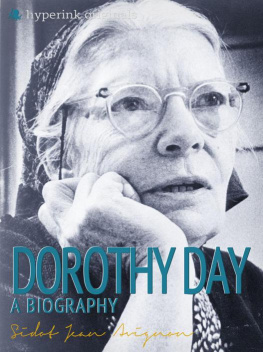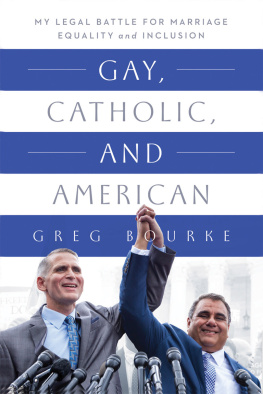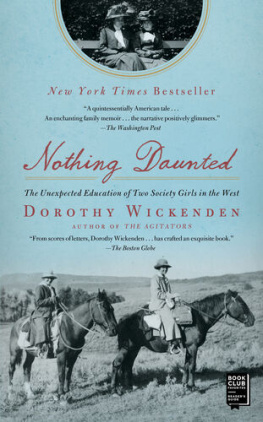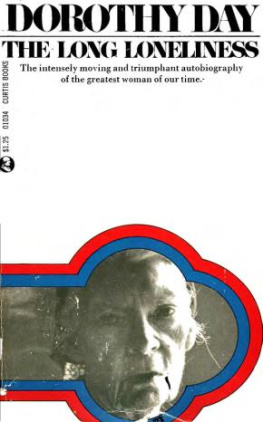Dorothy Day: A Biography
I.
Dorothy Day: A Biography
Introduction
Dorothy Day was an author and activist who fought tirelessly for women's equality and socialist causes during the early part of the 20th century as well as other social causes during the latter half of the 1900s. She also was one of the leaders of the Catholic Workers' Movement, which was the first organization to involve the Roman Catholic Church in social activism. Without Day's contributions to American history, modern America might be a very different country than most people know it to be, as she was instrumental in achieving freedom and equality for many groups of Americans.
Impressively, Day lived to be almost 100 years old and fought for social equality throughout her life . By studying her life, one can see the changing landscape of American society and the different issues that needed to be addressed to make America truly the free country it had been created to be. Dorothy Day fought for women's equality as a young woman and protested against the Vietnam War as an older one, making her a unique and interesting figure in American history. She lived through the women's suffrage movement, the Great Depression, both World Wars, the African-American civil rights movement and the Vietnam War and was involved in social action related to all of these events .
Day's political activities were only one part of what she achieved; she also was an accomplished writer as well as being instrumental in expanding the Catholic Church's ability to perform charity all over the United States by setting up non-profit institutions associated with the Catholic Workers Movement. Her Catholic charities, originally created to help victims of the Great Depression, are still in existence today; there are 130 Catholic Workers houses scattered throughout the United States, as well as houses in eight foreign countries .
There are many reasons to remember Day, from the novels she wrote in pursuit of social justice to her participation in hunger strikes and other non-violent means of protesting the oppression of women. Day's most important legacy is her refusal to accept injustice wherever it was found. If one method of protesting create the social changes she wanted to see, she moved on to something else. She faced the U.S. government and others in power with courage and determination, refusing ever to back down and accept inequality, poverty or other social ills as the natural order of things. As a result, she created lasting social change in many areas of American life despite the appearance that she was drifting from one thing to another.
Background and Upbringing
Dorothy Day was born in Brooklyn, New York in 1897. Her father, John Day, was a well-known journalist, and his career probably helped influence Day's later career as a writer and social activist. John Day, however, was not at all liberal; he had been raised in Tennessee and harbored prejudices against African-Americans and foreigners .
In any case, the young Day traveled widely throughout the United States because her father had a hard time finding steady work. For example, in the early 1900s, the family lived in San Francisco, but in 1906 a major earthquake disrupted John Day's ability to continue working there, and the family moved to Chicago . As a result of the constant moves from one part of the country to the other, Day felt isolated. At the turn of the century the telephone and airplane were new inventions, so it was difficult for people to keep in touch or visit one another after moving to a distant city. This made it difficult for Day to keep in touch with children her age after moving. The isolation and loneliness seriously affected Day, and she later wrote an autobiographical novel about it entitled The Long Loneliness .
The loneliness and isolation Day experienced may also have been responsible for her life-long interest in reading and writing. As a child, she was a voracious reader, which may have helped her to deal with her feelings that she was constantly alone. She also went for long walks around Chicago's South Side, where she observed that some people lived in abject poverty. Her own feelings of loneliness and the pain she saw all around her bothered her immensely. She felt empty and hungry for a spiritual connection because of all of this pain. Even as a child she read the Bible, which confused her non-religious parents.
In 1914, Day enrolled at the University of Illinois. Although she only remained at school for two years, this was an important milestone in her development, as it led to the beginning of her interest in socialism and social justice . Intellectually, her education was important because it exposed her to socialist writers such as Upton Sinclair and Leo Tolstoy. Socially, the University of Illinois allowed her to make friends with people who were unlike herself. Most of her friends at school were Jews who experienced discrimination on a regular basis. Some of them were interested in socialism or communism as ways to correct the social injustices that they experienced .
After two years of university education, however, Day grew too bored to continue her studies. She dropped out of the University of Illinois and moved to New York, where she found a group of radical people who supported the same causes she supported. Day began working for the New York Call , which was an influential socialist newspaper of the time . At this point in her life, Day was still trying to be a "good girl and claimed to be untempted completely by sex, which her friend Peggy Baird became determined to change. Baird insisted Day be a nude model and claimed that this would be a victory for the women's equality movement.
Day's personal successes as a journalist didn't fulfill her. She still felt empty and purposeless and drifted from one job to another, looking for answers. She needed spirituality in her life, and finally found it in the Catholic religion in 1927. Nevertheless, between the onset of World War I and the onset of the Great Depression, she was able to get some experience writing for various socialist newspapers and to begin her career as a journalist, as well as initiate her activity advocating for social justice in several other ways.
Major Accomplishments and Awards
Dorothy Day fought for social justice throughout her life by writing as well as by protesting. When she first came of age in 1917, the women's suffrage movement was in full force. Day joined protests in an attempt to get women the same right to vote as their male counterparts. She was arrested for "obstructing traffic" in front of the White House by joining in daily pickets. After her arrest, she went on a hunger strike to protest both not being allowed to vote and the poor treatment many of the women involved in the protest received while in jail. President Woodrow Wilson ordered Day and other hunger strikers released so that they would not die in jail and be seen as martyrs to their cause .
During this period of her life, Day also worked on a radical newspaper called The Masses . This newspaper called for an end to World War I, which it believed was caused by imperialism, and which it believed the United States should stay out of. Although Day didn't convince the US to change its policies by writing for this paper, her writing, and that of her friends, must have gotten the government's attention. After entering World War I, the government ordered The Masses to stop opposing its policies. When Day and the other socialists working on the paper refused to do this, the government seized back issues of the paper and rescinded its permit to mail copies out so that it could no longer distribute the paper through the U.S. Post Office. As a result of this experience, Day felt so powerless that she quit journalism and go to school to study nursing. Her experiences as a nurse, as well as some of her personal experiences during the early 1920s, led to the publication of her autobiographical novel,







